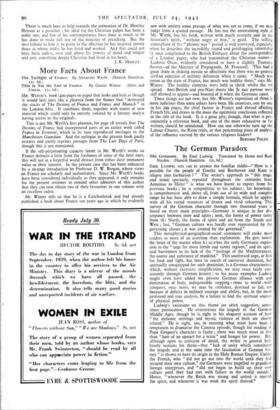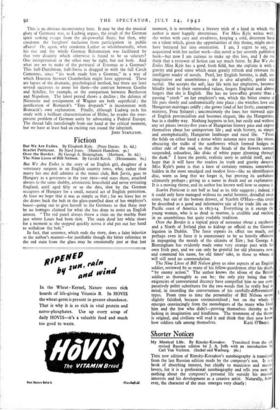The German Paradox
The Germans. By Emil Ludwig. Translated by Heinz and Ruth Norden. (Hamish Hamilton. I2S. 6d.)
Emil. LUDWIG sets out to answer the familiar riddle—" How is it possible for the people of Goethe and Beethoven and Kant to relapse into barbarism ? " The writer's approach to " this tragic and ironic spectacle, repeated throughout the centuries from Arminius to Hitler " is what we have learnt to expect from his previous books ; he is sympathetic to his subject ; his knowledge is comprehensive and, above all, from out of its wide and complex range he has been able to draw a simple formula, which he applies with all his varied resources of drama and vivid colouring. This survey of the German character through two thousand years is based on three main principles—Germany is unique in her dis- crepancy between state and spirit ; next, the forms of power come from th2 North, the forms of spirit and art from the South and West ; last, " German culture was hardly ever represented by the governing classes ; it was created by the governed." This metaphysical-geographical-social statement will strike most readers as more of an assertion than explanation. He gets nearer the heart of the matter when h. ascribes the early Germanic expan- sion to the " urge for more fertile and sunny regions," and its spiri- tual barrenness to its lack of the " heritage of the Mediterranean, the source and substance of mankind." This southward urge, at first for food and light, but later in search of universal dominion, but spiritually unequipped for such dominion, is a German characteristic which, without excessive simplification, we may trace fairly con- sistently through German history ; to his many examples Ludwig might even have added the present German alliance with and domination of Italy, indispensable stepping - stone to world - wide conquest, once more, we may be confident, destined to fail, not because of defects in military courage and ability, but, in the more profound and true analysis, by a failure to find the spiritual sources of physical power.
Ludwig's variations on this theme are often suggestive, some- times provocative. He overstresses the tragedy of the German Middle Ages, though he is right in his eloquent account of how " the inchoate strivings and mystic violence of both are closely related." He is right, too, in resisting what must have been a temptation to dramatise the Canossa episode, though his reading of Pope Gregory's character is faulty ; there was much more in this than " hate of an upstart for a scion " and hunger for power. But, although open to criticism of detail, the writer in general bril- liantly sustains his thesis—that " lack of unity which constitutes the tragedy and at the same time the fascination of German his- tory " is shown to have its origin in the Holy Roman Empire. Unlike the French, who " did not go out into the world until they had secured their own culture," the Germans were impelled to grandiose foreign enterprises, and " did not begin to build up their own culture until they had met with failure in the world outside." Hence, " whenever the Reich was strong and united it starved the spirit, and whenever it was weak the spirit thrived."
This is an obvious inconsistency here. It may be that the musical glory of Germany was, as Ludwig argues, the result of the German spirit seeking escape from the all-powerful State; but then, why condemn the burghers' exclusion from participation in public affairs? Or, again, why condemn Luther so wholeheartedly, when his rise and the whole German Reformation was facilitated by that very disunity which otherwise is found to be so salutary? One interpretation or the other may be right, but not both. And what are we to make of the portrayal of Erasmus as a German? This half-Dutchman, half-Swiss is dragged in with the full Czech Comenius, since " his work made him a German," in a way of which Houston Stewart Chamberlain might have approved. These are lapses of the dramatic, psychological method, but there are later several successes to atone for them—the contrast between Goethe and Schiller, for example, or the comparison between Beethoven and Napoleon. The latest period shows a decline ; the defence of Nietzsche and arraignment of Wagner are both superficial ; the justification of Bismarck's "Ems despatch" is inconsistent with Bismarck's own explanation. Finally, although Ludwig ends his study with a brilliant characterisation of Hitler, he evades the ever- present problem of German unity by advocating a Federal Europe. The thread falls tantalisingly from our hand at the critical moment, but we have at least had an exciting run round the labyrinth.
JOHN STAPLETON.



























 Previous page
Previous page